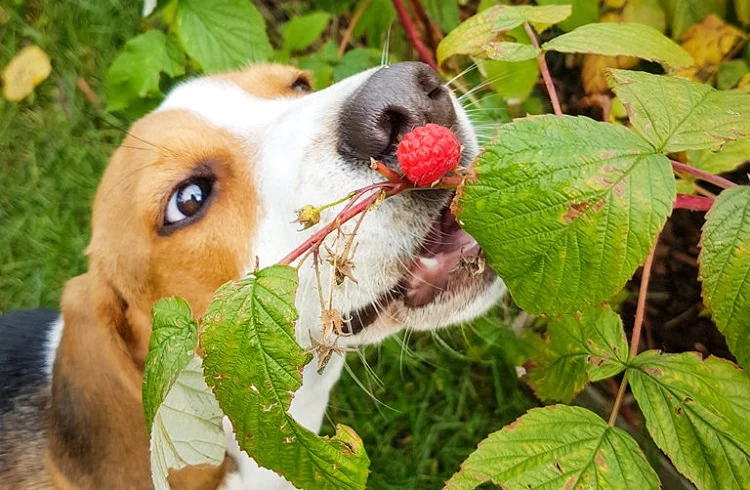Can My Dog Eat Raspberries?
Quick Guide
Raspberries are a delicious fruit that you cannot get enough of!
They are great to consume during summers when fruits are available in abundance. They grow well in areas where the climate is cool and pleasant. Raspberries come in different colors such as black, yellow, golden, and purple.
Predominantly, it has a rich reddish-pink hue and tastes divine – a combination of sweet and tart. Of all the varieties available, the red raspberry is the most popular variety.
But just because you can consume the fruit does not mean it is safe to give it to your dogs as well. Knowing which fruits and vegetables are safe to feed your dogs is essential.
Some fruits are safe and healthy for dogs to consume, while others are downright dangerous. For instance, fruits like cherries, apricots, and figs contain pits, which can be very dangerous when ingested.
If you are a new pet parent, you may be curious if it is okay to feed fruits to your dogs. And what fruits are beneficial for your dogs.
Are raspberries safe for your dogs to consume? The answer is an emphatic YES! Raspberries are thoroughly safe for your dogs as long as you limit the intake.
Feeding your dog table scraps when you are having a meal is only all too familiar and can be tempting. And Raspberries are a delectable summer treat that you can feed to your pets without any qualms.
Let us delve deeper into whether it is okay for you to feed your pet dog with raspberries, whether they come with any health benefits, and what berries are harmful to your dog.
Can Dogs Eat Raspberries?
Dogs can eat berries. All sorts of berries like strawberries, blueberries, blackberries, cranberries, and raspberries are safe for your dogs to consume.
It would be hard to find someone who does not like raspberries! So it is only natural to want your dog to enjoy the same treats you do. But the rule remains the same for dogs as it does for humans. Anything in moderation!
Health Benefits Of Raspberries For Dogs
A dog’s predominant nutritional requirements should come from dog treats. So, while it is okay to give them fruits like raspberries as an occasional treat or in moderation, please don’t give them too much, or they may become sick.
Most of the nutritional requirements for a dog come in high-quality dog food. 90% of your fur buddy’s daily dietary needs should come from dog food. Raspberries contain antioxidants that help fight heart attack, obesity, cancer, and other deadly diseases.
The antioxidants in raspberries are apt for older dogs, thanks to anti-inflammatory properties that help alleviate joint pain. Raspberries are also rich in other nutrients like:
- Vitamin C, Vitamin K, and B-Complex
- Fiber
- Minerals like folic acid, manganese, magnesium, potassium, etc.
- Copper
- Folic acid
- Iron
But this is not all. Raspberries are also an excellent source of dietary fiber, which helps in tackling obesity and enhances overall digestion. The fiber in raspberries is suitable for dogs that are a little bulky.
It is because even small amounts of raspberries will help them to feel full for longer. Senior dogs will particularly benefit from the anti-inflammatory properties that help reduce joint pain and arthritis.
As far as feeding fruits to dogs is concerned, there are two things you should keep in mind. For one, fruits are loaded with sugar. The fructose present in fruits is entirely different from sucrose, which is what you add to your cup of tea, coffee, juice, or smoothie.
Even though fructose is “au naturel,” it is still unsuitable for dogs. The digestive system of a dog is such that it will be unable to process proteins and fats, not sugar. While it is okay to occasionally feed sugary treats to your pets, regularly doing so will cause more harm than good.
The good news is that the sugar content in raspberries is relatively low. Combined with fiber, it aids in easy digestion and obesity. It is way better than biscuits, cookies, or cakes that you give your pet when they are terrific.
Although it comes with all these health benefits and is preferable over other “human” foods, it doesn’t enhance overall health. It is relatively harmless, so you can have no qualms about giving them to your dog.
If you thought it is okay to feed food with lots of sugar content, think again. Like humans, eating food with lots of sugar can be a primary cause of diabetes in dogs. If your dog is a raspberry fan, it is still not good to overeat it. If your dog goes on a raspberry spree and consumes too much of it, it could lead to vomiting, constipation, diarrhea, and other stomach-related issues.
Despite all these health benefits, they contain a natural sweetener called xylitol. Although the amount of xylitol is minimal, consuming bucketloads of it is poisonous and can turn out to be quite fatal.
What is worse, xylitol can contribute to hypoglycemia and liver disease development. It takes around 32 cups of raspberries for the dosage to be lethal for your dog. There is no way your dog can consume so much no matter how fond he is of it.
So, always serve raspberries in moderation, no matter how much your dog loves consuming it! And keep in mind, fruits for dogs should be considered treats. Not for their nutritional value.
Feeding Raspberries To Your Dog
You can give fresh or frozen raspberries to your dogs. Just ensure you don’t give it along with protein. Otherwise, it may hamper the digestive process.
Before you serve raspberries to your dogs, wash them properly. It will help remove the dirt on the top layer of the fruit and eliminate residual chemicals. To make it easier for your dog to swallow the fruit, you can cut them either into small pieces, mash them, or puree them.
However, if you have a large dog at home and are fond of raspberries, you can slice them up and give them whole. If your dog is new to eating raspberries and is entirely unfamiliar with the texture, you can give them frozen treats.
For pups, frozen treats can be a real treat! To prepare frozen raspberries, place them in ice cube trays full of water and freeze them in the refrigerator. These, too, should be given in moderation. Ensure that they are not clumped in a freezer burn mess.
Otherwise, your dog may choke on it. Also, avoid providing canned raspberries, even as occasional treats. Canned raspberries not only contain a high amount of sugar but also contain dangerous preservatives that can be harmful to your dog.
Should you let your dog eat wild raspberries?
Wash the raspberries carefully before you or your dogs consume them. If your dog(s) overeat this fruit, they may end up becoming sick.
Furthermore, selective breeding has resulted in more extensive, sweeter, and more sugary raspberries.
The excessive sugar content can lead to diabetes so take caution before allowing your dogs to feed on wild raspberries. If you can avoid it, nothing better!
How many raspberries can a dog eat?
Limit the serving of raspberries to one cup at a time. Low in calories and sugar, feel free to allow them to indulge in these sugary treats occasionally. It holds even if you have a large dog as a pet.
Raspberries are low-sugar fruits. The amount of raspberries you give your dog depends on your dog’s size and its fondness. If you have a large dog at home, say a labrador, then he can very well have 6 to 10 berries.
If you have a smaller breed of dog or a pup that is fond of raspberries, restrict the raspberry intake to 3 to 6 raspberries per day.
Berries Your Dogs Must Avoid
Fruits, especially berries, are not just nutritious, but they are healthy and delicious. Some of the most popular berries include Blueberries, Raspberries, Strawberries, Cranberries, Blackberries, and Grapes.
Strawberries are high in water content, fiber, and vitamins. They are also antioxidant-rich. They do contain sugar, so be cautious about giving them in excess. This humble fruit is good for humans and dogs alike.
They help fight cancer, lower cholesterol levels and balance your blood pressure levels. Did you know that the enzyme in strawberries helps whiten your dog’s teeth as the fruit goes down?
Blueberries are another fantastic treat that you can use to feed dogs in the place of unhealthy treats that you buy from the store. They also help prevent
Cranberries are bitter, so your dog may not be all that fond of them. Note that cranberries have a natural tart taste and are full of Vitamin C.
The acidic nature of this berry makes it a natural urinary disinfectant. No doubt it is suitable for your dog. But the question is: will your dog enjoy eating this berry? Highly doubtful!
Raspberries make for a fantastic summer treat and are an even better option than ice creams or popsicles.
Not all berries are safe for your dog. Berries with pits can turn out to be super dangerous for your dog.
Before giving any food, do your research before feeding. If you have a naughty fur buddy at home that steals food from the kitchen counter, then take care! Berries with pits in them can pass through the intestines, which can turn out to be a choking hazard if your dog is impatient while swallowing them.
Take caution with cherries too. Cherries have pits in them, and the size of the cherry pit is such that it may pose a potential choking hazard to your dog.
What is worse? The leaves to the stems, to the shrubs – every part of the cherry contains cyanide which can be fatal if consumed. If you love eating cherries, keep them out of reach of your pets and when you finish eating them, dispose of them carefully.
Peaches are just as bad for your dogs as cherries. The cyanide content in the pit of the peach fruit is just as harmful to your dog. Peaches are suitable for the eyes, skin, and overall immunity. Like with other fruits, serve only one slice at a time and moderate quantities.
You should wholly avoid grapes and raisins for your dogs. No matter the age, sex, or breed of your dog, avoid feeding them grapes at all costs. Eating them can lead to acute kidney failure in your favorite companion, so store them out of reach.
Conclusion
The digestive capacity of dogs is entirely different from how humans digest food. Eating the wrong type of food can lead to plenty of health problems and digestive-related issues.
There is simply no need to give your dogs fruits for their nutritional aspects. If you want to provide them with a sugary treat now and then, then provide them with some raspberry love!
Berries with pits are your fur buddies’ enemy. If your dog happens to consume any fruit with pits in it, rush to the vet without further delay.
Raspberries are soft, easy for the dogs to nibble on, and contain ingredients that are thoroughly safe for your dogs to consume. Having one or two on an occasional basis is entirely alright.
In this article, we saw the health benefits of raspberries, how much it is okay to feed your dogs, and the types of berries poisonous to dogs.
Use this as a guide to give them what they love, albeit in small quantities!
These flavorful, fruity snacks are something not just humans go gaga over, but dogs as well. So, go ahead and share some with your best companion the next time you reach out for a bowl of fresh raspberries.
Bon appetit!













